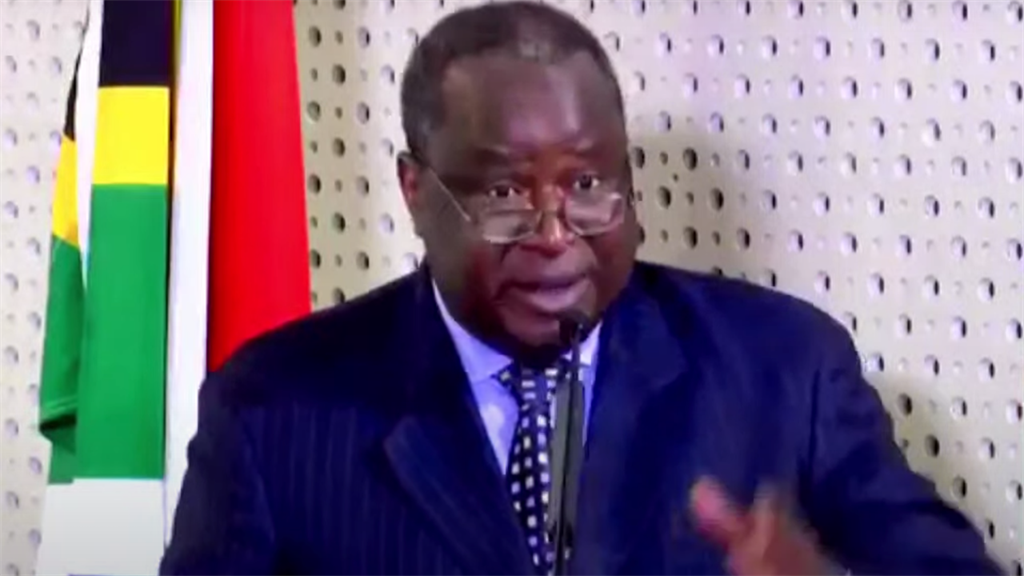


Finance minister Tito Mboweni delivering SA’s coronavirus budget. (Parliament of SA)
- Pension funds could be used to finance infrastructure projects, if Regulation 28 of the Pension Funds Act is amended, says Finance Minister Tito Mboweni.
- Government, however, has no intention on adjusting the percentage that should be invested in this asset class beyond 25%.
- The Financial Sector Conduct Authority is working on policy in this regard.
Finance Minister Tito Mboweni says pension funds or retirement savings should be used to finance infrastructure projects.
The Minister was on Thursday speaking during a briefing to Parliament’s finance and appropriations committees about the supplementary budget, where he weighed in on amending Regulation 28 of the Pension Funds Act in response to a question from DA MP Geordin Hill-Lewis about his position on asset prescription.
The prescription of assets is a policy whereby the state obliges institutions such as pension funds and insurance companies to have a specific holding in certain assets.
Mboweni said Regulation 28 provides guidance to pension funds and similar institutions on their investments. Currently it refers to the investment in immovable property.
“There has been a narrow definition from investment managers on how they deal with this regulation,” Mboweni said. “Government wants the definition to include immovable property and infrastructure. That is all we wanted to do, try to unlock in the minds of investment managers that they can invest a percentage of their investable funds in infrastructure, in addition to immovable property.”
Mboweni said that the Financial Sector Conduct Authority intends to release a policy document in this regard. He is hopeful that it will be released in the next six months, he said.
The regulation provides guidance on the different percentages that should be invested in certain asset classes, he explained. The current percentage allocated to immovable property is 25%. Government has no intention of amending this allocation, Mboweni assured.
- READ | Head of Eskom Pension Fund sees savings key to economic recovery – but there’s a trust deficit
This echoes a proposal in a draft document by the ANC’s economic transformation committee on the country’s economic recovery post Covid-19, which puts forward that pension fund investments be directed toward infrastructure and capital projects.
ANC head of economic transformation Enoch Godongwana previously told Fin24 that not all asset classes such as infrastructure were properly covered by Regulation 28, and the proposal was that it be tweaked.
Deputy Finance Minister David Masondo also shared his perspective on the matter, saying that Regulation 28 ensures retirement funds are “safe” or should be deployed in a way that yields “good returns for savers”.
“Retirement funds are safe, there is no intention to change regulation in a way that will sacrifice safety and returns on retirement funds,” said Masondo.
Momentum Investments economist Sanisha Packirisamy, however, warned that the situation could be quickly become “unpalatable” for investors. Most fixed income managers probably would be willing to invest in infrastructure projects which are “viable and backed by solid proposals”, she said.
“If it is anything wider than that, and if institutions are forced to invest in infrastructure projects which are not conditional, and do not have solid proposals backing it that sort of goes into a prescribed assets type of environment, which is not conducive for investments into SA.”
Investec chief economist Annabel Bishop also noted that government was targeting private sector savings to fund infrastructure projects. “Pension funds are already a very large holder of state debt. The huge ramp up in projected debt and issuance is at odds with the limited savings pool in SA, and will add to pressure for further credit rating downgrades,” she said.
- READ | ANALYSIS | Mboweni’s zero-based budget – the backstop before a spiralling debt crisis?
When it comes to plugging government’s revenue shortfall, which is R300 billion short of the February budget’s target, Packirisamy is far more optimistic about financial support from multilateral finance institutions.
South Africa is in talks to secure $4.2 billion from the International Monetary Fund. It has been granted a $1 billon loan from the New Development Bank and it has “pencilled in” a $1 billion to $2 billion loan from the World Bank, said Treasury Director-General Dondo Mogajane.
Throughout the meeting, Mogajane and Mboweni explained that the loans from these multilateral institutions do not come with the stringent conditions they are known for, as this financial support is strictly for Covid-19 measures. Mboweni stressed that government had been locked in negotiations with the IMF to demonstrate how the country intends to pay back the loan, which is without conditions.
Packirisamy explained that if South Africa were pushed to apply for additional funding from the IMF, over and above the Covid-19 relief, this would have costs attached to it and be conditional.
But even still, the costs would be cheaper than government having to borrow from the market, and the conditions would likely require reforms which the private sector would want to see. It would still be a better option than asset prescription, or having the Reserve Bank take on government debt directly, she said.

